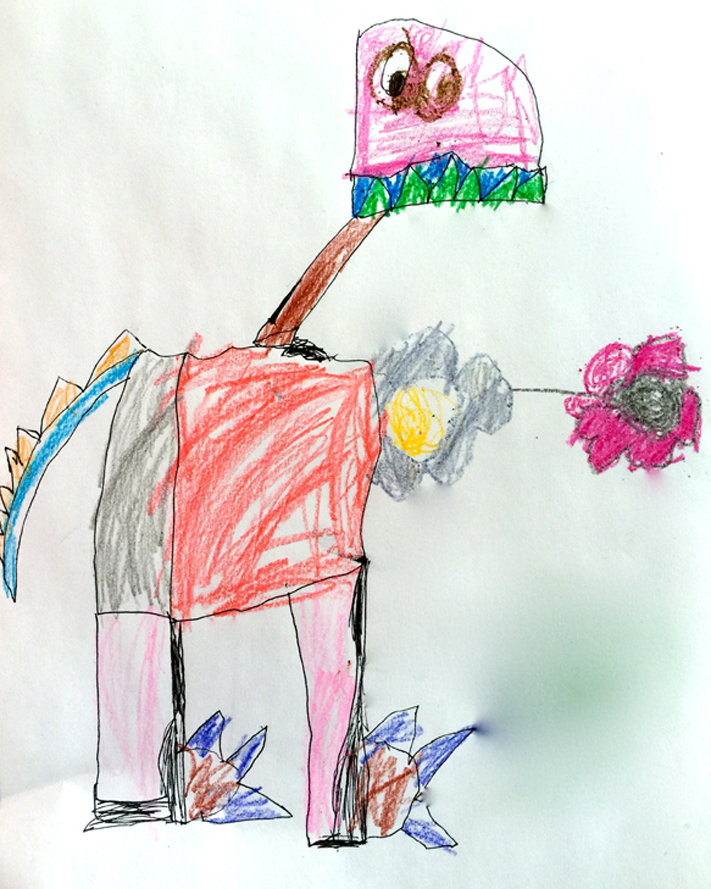By Laurie Levy, M.Ed. | Originally Published at Chicago Now. January 26, 2015 at 6:40 am
So in honor of Inspire Your Heart With Art Day this coming Saturday, January 31, I’m going to think about why kids are often uninspired, especially as they grow older. The green blur in the picture above represents my effort to erase the teacherly comment using my computer. It seemed to pacify my grandson, but it got me to thinking. Is there a way to erase the impact of such comments from the minds of my grandkids and their peers? Can we simply respect art for kids without judging it at the same time? That will probably take much more than some crude photo shopping.
As a former teacher, there were countless times I wielded my red pen to write on a student’s composition . So I know all of the pat phrases teachers use:
Good job
Nice work
Great effort
Interesting ideas
But seeing my grandson’s reaction to a nice comment written on his drawing, his effort, his creation got me thinking. Does every effort by a child require “good job,” either verbally or written? I catch myself saying it all of the time. Does my praising what a child creates somehow diminish it for the child?
I’m not sure of the answer to that question. And I’m not sure a teacher’s comment written across the top of a picture or creative composition makes the artist or writer feel better about the work. Perhaps it’s enough to tell the child you like the picture she drew or the story she wrote because…
The colors you used are so bright.
I like the way you made the girl in your story strong and smart.
I can tell how hard you worked on that. You spent a lot of time doing it.
The idea you are writing about must be important to you. Thank you for sharing it.
When the mother of the children fighting over the picture was in preschool, her teacher handed me an easel painting my daughter had made that she thought was remarkable. It looked like a still life of brightly colored fruit in a bowl. The teacher made such a fuss over it that I decided to frame it, and it hung in my kitchen for years. One day my daughter asked me to take it down.
“Why, “ I asked. “Do you feel like you are too old to display your preschool art?” Well, that wasn’t the issue at all. She confessed that she always hated that picture because she was not finished with it when her teacher snatched it from her. And, by the way, it was never meant to be a bowl of fruit.
I felt really sorry that I never thought to ask her to tell me about her painting. I just assumed the teacher’s enthusiasm was the correct response. So when her son cried about his sister writing “good job” on his picture, she understood.
Perhaps a child’s own sense of satisfaction with his or her work is all the validation that is needed.
Laurie Levy, M.Ed., has worked over 30 years in the early childhood profession. She is a strong believer in diversity and the rights of children with special needs, and a passionate advocate for children. Through her writing, she seeks to empower parents and educators, and create caring and just communities. She was founder and executive director of Cherry Preschool, an innovative developmental program that includes and celebrates all children. Her personal experiences as the grandparent of children with special needs, as well as her many years working for inclusion, have made her an advocate for the rights of those who cannot speak for themselves. Laurie is a regular blogger at ChicagoNow.
This piece was reprinted by EmpathyEducates with permission or license. We thank the Author, Laurie Levy for her kindness, profound, and inspirational reflection. May we all fully be aware of the power of words.












Here’s the thing… when you praise an artist’s work in that way, you are holding yourself up as being qualified to judge/grade/evaluate it. Seems ironic, but it is true. For an artist, there is a HUGE difference between someone telling me “I love that”, and telling me “good work”.
You’re not entitled to tell me it is good. If you were, then you would also be entitled to tell me it was “bad”. I think it is good. It represents my vision, and my effort. I am the artist. Period. Telling me “good job” or “nice work” cedes power to which you are not entitled.
But I AM interested, VERY MUCH in whether or not you like it. I am interested in how it make you feel, what it reminds you of, what it says to you. I always want to know how my work affects people, or fails to do so.
This difference may seem trivial, but it is not.